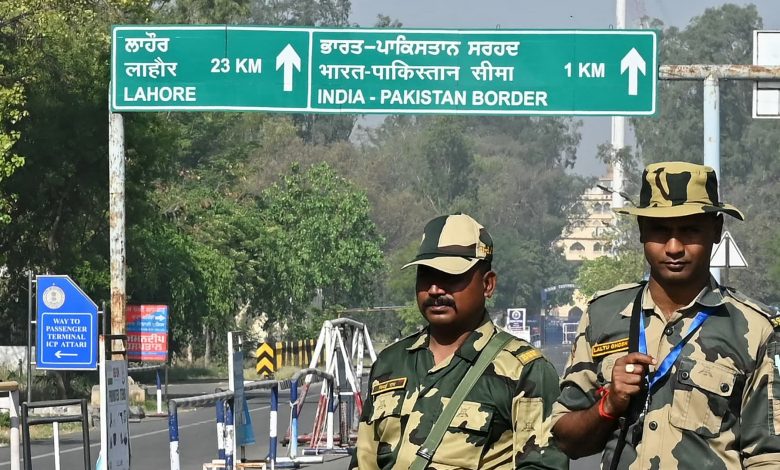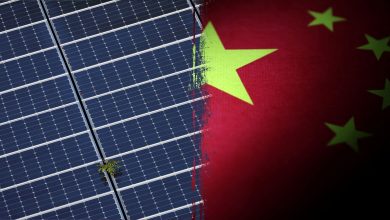Could border flare-ups threaten India investments?

This report is from this week’s CNBC’s “Inside India” newsletter which brings you timely, insightful news and market commentary on the emerging powerhouse and the big businesses behind its meteoric rise. Like what you see? You can subscribe here.
The big story
Indian Border Security Force (BSF) soldiers stand guard at the entrance of the India-Pakistan Wagah border post, about 35kms from Amritsar on April 24, 2025. India took a raft of punitive diplomatic measures against Pakistan on April 23, accusing Islamabad of supporting “cross-border terrorism” after a deadly attack on civilians in Kashmir. (Photo by Narinder NANU / AFP) (Photo by NARINDER NANU/AFP via Getty Images)
Narinder Nanu | Afp | Getty Images
The Indian stock market has emerged from a volatile few weeks and soared past the level it was before the latest India-Pakistan flare-ups.
It shouldn’t come as a surprise, though, because for a growing cohort of global investors focused on India, such border crises, while serious, are viewed as just one variable in a far more complex equation — for now.
While Indian stock markets initially dipped after it became apparent that India and Pakistan were headed toward armed conflict, Kieron Kader, an associate fund manager on Alquity’s Indian Subcontinent fund, told CNBC that the episode was “not going to change the overall return profile dramatically.”
Instead, the ensuing volatility was a “gift to the long-term investor,” Kader added. He bought shares of NYSE-listed MakeMyTrip, Lemon Tree Hotels and Samhi Hotels after they tumbled, only to see them rise strongly since.
He isn’t the only one with that view.
Anand Gupta, lead portfolio manager for Allianz India Equity fund, pointed out that the Indian equity market displayed “remarkable resilience” during the crisis peak, with the MSCI India index seeing only a “modest correction” of around 1.5% despite a spike in the India VIX, or “fear gauge.”
He attributed this to “investor confidence supported by India’s strong economic fundamentals” and a “historical pattern of limited market disruption during geopolitical flare-ups of this nature.”
Indeed, the risks from recent military flare-ups appear to have been offset by the fact that India is considered by many to be an attractive investment destination. Research from Barclays’s credit team also noted that the “macro impact is limited for both India and Pakistan” from the recent conflict.
However, while the hostilities may not have spooked investors, over the longer term, rising geopolitical tensions could pose risks.
And there have been some surprises in the conflict this time around. Events from earlier this month have marked a significant escalation from previous skirmishes between the two nuclear-armed nations. For the first time, both claimed to have attacked territories deep into the opposing side.
In contrast, the Balakot strikes in 2019 saw India hitting locations very close to the border. The Indian Air Force mostly kept within India during the 1999 Kargil war. For decades, most conflicts between the two remained largely on land.
While investors may be somewhat desensitized to India-Pakistan tensions, the political willingness to escalate conflict has raised concerns for some, given the wider geopolitical situation around the world.
“Geopolitically India is not in a great situation,” said Venugopal Garre, head of India research at Bernstein, in a note to clients on May 7. He pointed to the change of political stance toward India by neighbors Bangladesh and Sri Lanka, and its traditional allies, Russia and Israel. These countries are now occupied with war closer to home. Garre added that China’s support of Pakistan doesn’t help either.
India has a precarious relationship with China — its largest neighbor — exhibiting certain qualities that are similar to its relationship with Pakistan.
China and India share a long border with many points of disagreement that have remained unsettled for decades. The two countries also went to war in 1962 over a border dispute. More recently, 20 Indian soldiers were killed in a clash with Chinese forces in a disputed Himalayan border area in 2020.
While an actual military conflict between the two Asian giants is deemed “very, very unlikely” by Alquity’s Kader, he admits that such an eventuality would be a “very scary situation” potentially requiring “global intervention” and significantly elevating India’s risk premium.
The scenario is seen as being near-impossible because, economically, the two countries have an interdependent relationship.
Bernstein noted: “India needs China to help build its low-end assembly franchise while China may consider India as potential market (it runs a large trade surplus with India which it may not want to risk losing).”
Historically, however, India and Pakistan were also tied together economically as well as culturally. Yet, recent events show that when violence erupts, it can be difficult to predict how far each side will go. Investors might want to take note of the risks.
Need to know
Trump doesn’t want Apple building products in India. The U.S. President said he told Apple CEO Tim Cook that he doesn’t want the tech giant to build its products in India, taking shots at the company’s moves to diversify production away from China and urging him to pivot stateside.
India’s consumer inflation rate in April cools. Headline inflation fell to 3.16% in April from 3.34% in March, and came in lower than the 3.27% expected by economists polled by Reuters. It was the sixth straight month that price increases moderated. Food inflation, which is a key inflation metric in the country, dipped to 1.78% in April, from March’s figure of 2.69%.
Wholesale prices in India also fell. In April, wholesale inflation, which serves as a proxy for producer prices, rose 0.85% on an annual basis, much lower than the 2.05% increase the previous month and marking the slowest increase in more than a year. The reading was also lower than the forecast of 1.76% by a Reuters poll of economists. Encouraging consumer and wholesale inflation readings open the door to more rate cuts by the Reserve Bank of India.
India raised the idea of retaliatory tariffs on America. Even as India is reportedly negotiating a trade deal with the U.S., the South Asian country on May 12 proposed to the World Trade Organisation that it retracts tariff concessions to the U.S., which would amount to $1.91 billion in duty collected from U.S. imports.
The ceasefire between India and Pakistan is brittle but intact. Both countries reached an agreement to stop military action on May 10, but have accused one another of violating it. That said, armed conflict has largely abated from the height of hostilities beginning May 6, which India said was a response to a militant attack last month in Pahalgam, Jammu and Kashmir, in which 26 people were killed. In a post on Truth Social, U.S. President Donald Trump offered help to find a “solution” regarding Kashmir.
What happened in the markets?
The Nifty 50 index closed above 25,000 points for the first time since October, as it heads for a 4.4% gain this week. The index has risen 6% this year.
The benchmark 10-year Indian government bond yield declined to 6.23%, down by about 10 basis points from last week.

On CNBC TV this week, Shilpak Ambule, India’s high commissioner to Singapore, said India will not distinguish between “terrorists and government sponsors of terrorist,” and further discussed India’s perspective of its conflict with Pakistan that broke out earlier this month. Ambule stressed that India is still forging trade ties with countries such as the U.S., the European Union and New Zealand amid its hostilities with Pakistan.
Meanwhile, Mark Mobius, founder of Mobius Investments, said India is the “most exciting place” now because it will replace China in many areas. For instance, Apple has already shifted some of its manufacturing and export operations to India. Mobius also said Prime Minister Narendra Modi is doing a good job of cutting through the Indian bureaucracy, streamlining the country’s infrastructure and economy.
What’s happening next week?
India’s balance of trade figures, out Friday, will receive more scrutiny than usual, given U.S. President Donald Trump’s emphasis on trade imbalances between America and its partners. Meanwhile, Integrity Infrabuild, a construction company, lists Tuesday, followed by Accretion Pharmaceuticals on Wednesday.
May 16: India balance of trade for April
May 20: Integrity Infrabuild Developers IPO
May 21: Accretion Pharmaceuticals IPO
May 22: India HSBC PMI flash data for May



